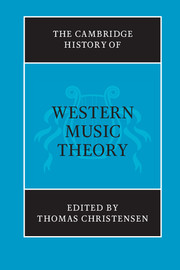Book contents
- Frontmatter
- Introduction
- PART I DISCIPLINING MUSIC THEORY
- PART II SPECULATIVE TRADITIONS
- 4 Greek music theory
- 5 The transmission of ancient music theory into the Middle Ages
- 6 Medieval canonics
- 7 Tuning and temperament
- 8 The role of harmonics in the scientific revolution
- 9 From acoustics to Tonpsychologie
- 10 Music theory and mathematics
- PART III REGULATIVE TRADITIONS
- PART IV DESCRIPTIVE TRADITIONS
- Index of authors
- Index of subjects
- References
5 - The transmission of ancient music theory into the Middle Ages
from PART II - SPECULATIVE TRADITIONS
Published online by Cambridge University Press: 28 March 2008
- Frontmatter
- Introduction
- PART I DISCIPLINING MUSIC THEORY
- PART II SPECULATIVE TRADITIONS
- 4 Greek music theory
- 5 The transmission of ancient music theory into the Middle Ages
- 6 Medieval canonics
- 7 Tuning and temperament
- 8 The role of harmonics in the scientific revolution
- 9 From acoustics to Tonpsychologie
- 10 Music theory and mathematics
- PART III REGULATIVE TRADITIONS
- PART IV DESCRIPTIVE TRADITIONS
- Index of authors
- Index of subjects
- References
Summary
The chronicle of musical thought in the Latin world from the beginning of the Common Era through the first millennium of European history presents a metamorphosis of various intellectual traditions into what we today call “music theory.” The adjectives “middle” and “dark” hardly apply to these ages when one is writing the history of musical thought, for these centuries witness the beginning – indeed the birth – of that Western discipline which attempts to reflect systematically about given musical phenomena and apply these reflections to the analysis and composition of musical repertoires. While one might speak of a tradition of musical thought during the early Middle Ages, the integrity of that tradition is achieved not by any continuous thread that runs through the whole, but by a number of overlapping strands that give strength to a broad tradition. Often these strands forming the very core of musical thought draw their character from traditions other than music, and the continuity of musical reflections must be viewed from proximate perspectives.
While the first millennium saw the birth of Christianity and the flourishing musical liturgy built principally around psalmody, in the first centuries of the new millennium the study of music theory as a technical discipline remained largely isolated from the fresh artistic tradition. The development of musical learning in the Latin West basically grew from the technical subject formulated by the ancient Greeks, namely musica (μoνσiκή) or harmonica (αρμoνiκα). (see also Chapter 4, pp. 109–35). Hence in the early sections of this chapter, music theory as a general discipline will be referred to as musica to distinguish it from “music,” which would imply the totality of musical experience, practical and theoretical, or from “music theory,” which would imply some relation between a repertoire and systematic reflections concerning music.
- Type
- Chapter
- Information
- The Cambridge History of Western Music Theory , pp. 136 - 167Publisher: Cambridge University PressPrint publication year: 2002
References
- 28
- Cited by

